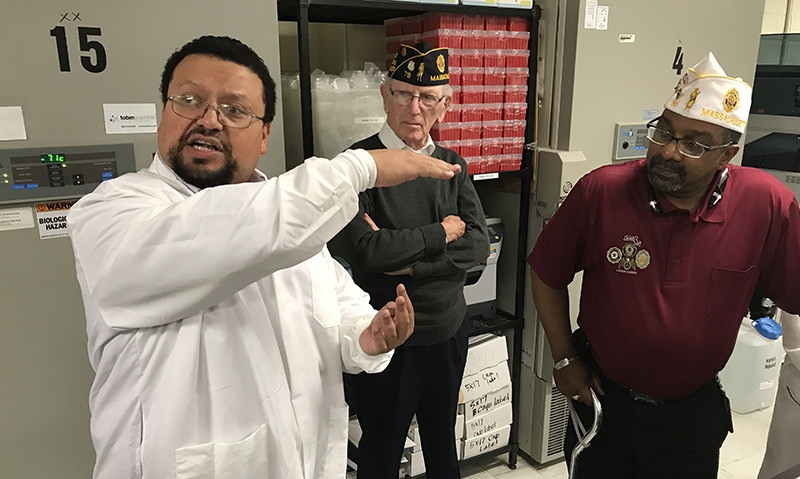
The Million Veteran Program is learning how genetics affect health by collecting blood samples and health information from one million veteran volunteers.
American Legion Past National Commander Jake Comer, Department of Massachusetts Commander Ken Starks, and members of the Legion's Washington, D.C., office visited the Million Veteran Program (MVP) at the Jamaica Plain VA Hospital on April 27 to learn about cutting-edge genomic research and the promise of developing advanced therapies for the treatment of diseases.
The MVP is a national research program funded by the Department of Veterans Affairs in partnership with veterans receiving care in the VA health care system.
The purpose of the MVP is to learn more about how a person's genetics affects their health so that doctors can better understand diseases and design future treatments specific to an individual's molecular body composition.
The research is led by Dr. Mike Gaziano and Dr. John Concato who co-lead the MVP as principal investigators.
“We are doing this for veterans, and we are leading in building the best and largest genetic cohort in the world,” Gaziano said. "We are just beginning to scratch the surface of the potential of this research. It is an exciting paradigm shift that will have as large an impact on medical science as the Apollo space missions, the Hubble Telescope, and the supercollider at CERN had on the world of physics."
This database is already providing medical researchers opportunities to study the ways a person’s genes contribute to Gulf War Illness and post-traumatic stress disorder risk factors, functional disability in schizophrenia and bipolar illness, substance abuse, obesity, diabetes, heart, kidney and cardiovascular disease, and macular degeneration.
Gaziano and his team of medical researchers are actively recruiting veterans to participate in this project with the goal of obtaining one million DNA samples.
Launched in 2011, the program reached its half-way goal in August of 2016 when they collected their 500,000th DNA sample - establishing the MVP as the largest genomic database in the world.
The success of the program relies on three factors:
-
Veteran volunteers,
-
Access to veterans' electronic health records, and
-
Completion of a lifestyle questionnaire and DNA blood sample.
The American Legion leadership is excited about the potential of this project to improve health care for veterans and all Americans.
Legionnaires interested in participating in this landmark study can apply at www.research.va.gov/mvp.
Data collected from the MVP will be stored anonymously.
- Veterans Healthcare

